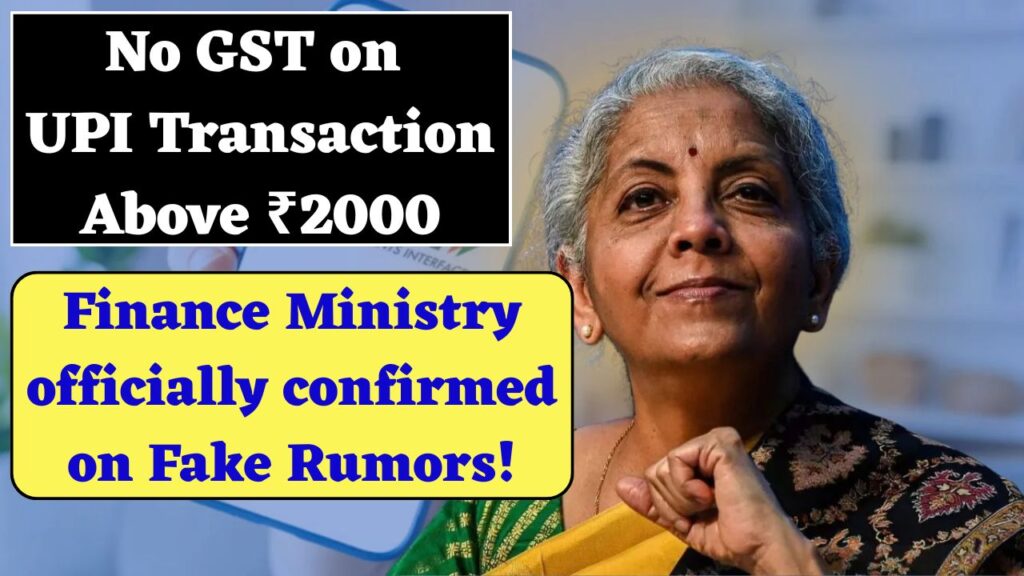No GST on UPI Transaction Above ₹2000: Recent reports circulating on news platforms and social media have created widespread confusion regarding the imposition of Goods and Services Tax (GST) on UPI transactions exceeding ₹2000. Some media outlets and social media users have claimed that the government is planning to levy an 18% GST on UPI payments above this threshold. However, these claims are factually incorrect and misleading.
18% GST on UPI Transaction exceeding ₹2000 Fake or Real?
The speculation gained traction after ET Now published a report on April 18, 2025, titled “GST on UPI payments or transactions above Rs 2000? What experts argue.” Although the article discussed a hypothetical scenario, it fuelled rumors suggesting that GST would soon be levied on high-value UPI transactions.
Following this, numerous social media posts, particularly from anti-government handles, spread the claim, further amplifying public outrage. A now-deleted post by X (formerly Twitter) user @IndianGems_, shared by pro-AAP user Kapil (@kapsology), alleged that the government intended to tax already-taxed money used via UPI. The post argued that individuals already pay income tax and GST on goods and services, and now they would be taxed on the payment method itself.
Crypto influencer Sumit Kapoor also weighed in, stating that such a move would negatively impact freelancers, small businesses, and the middle class.
Government’s Clarification: No GST on UPI Transaction Above ₹2000
Despite the rumors, no such proposal exists to impose GST on UPI transaction values above ₹2000. The confusion appears to have stemmed from a misunderstanding of charges applicable to Prepaid Payment Instruments (PPIs) and card-based UPI transactions, which are distinctly different from standard UPI payments made through bank accounts.
Uttarakhand Board Results 2025: डायरेक्ट लिंक से चेक करें UBSE Class 10th & 12th Marks
TS Inter Results 2025 for 1st and 2nd Year – Check Result Date and Download TS Inter Result
ET Now Report about GST on UPI Transaction Above ₹2000
While the ET Now report contributed to the confusion, it does not cite any official government source. In fact, the article itself clarifies in the opening paragraph that such a scenario is “hypothetical.” It states:
“But what will happen if GST of 18 percent is charged on transactions above ₹2000, will you continue using UPI transaction for daily payments or return to cash? Well, as of now, considering the way the government is promoting digital economy or digital payments mode and increase the use of UPI in our country, govt may not make such decision or official announcement which will affect the economy and public.”
This clearly indicates that the report was speculative in nature, not based on any policy announcement or official communication.
Understanding Service Charges and GST on Digital Payments
Here’s what you need to understand about Service Charges and GST related to digital payments:
- UPI payments made directly from your bank accounts which is linked to the UPI app such as phone pay/Google pay/Gpay which is continue to be free of any service charges.
- P2P (Peer-to-Peer) and P2M (Peer-to-Merchant) UPI transactions which involves bank accounts are yet not subject to any fee or GST charges.
- The 1.1% service charge being applies only to UPI transactions made through PPIs, such as digital wallets or credit cards linked to UPI apps.
This 1.1% service charge is applicable to the merchant, not the consumer. Since it’s a service charge, the standard 18% GST on service fees becomes applicable—not on the transaction amount, but on the service charge itself.
UPI and MDR: What’s the Current Status?
In India, most digital payments through UPI are not subject to the Merchant Discount Rate (MDR). However, in cases involving credit cards or PPIs, MDR is applicable. For example:
- MDR on credit card payments typically ranges between 0.5% and 2%.
- As of now, Rupay credit card-based UPI transactions are exempt from MDR.
- While there has been discussion around introducing MDR on UPI payments to help service providers recover costs, no such proposal has been approved or implemented yet.
Less Than 1% of UPI Transactions Affected
According to the government and NPCI data, less than 1% of UPI payments are made using wallets or credit cards. This means over 99.9% of UPI transactions are not subject to any service charge or GST. The vast majority of users making payments via UPI using their bank accounts will not face any additional cost or tax.
GST on UPI Transaction Above ₹2000: What’s the Update?
Currently, there is an exemption on GST for digital payments below ₹2000 when using debit or credit cards. However, the GST Council had proposed an 18% GST on MDR for such small-value transactions last year. This proposal has not been implemented.
Importantly, this discussion is also limited to debit and credit card payments, and does not extend to UPI transactions.
Important Updates about GST on UPI Transaction Above ₹2000
- There is no GST on UPI payments made through bank accounts.
- No official announcement done form govt to impose 18% GST on UPI transactions above ₹2000.
- A 1.1% service charge (with 18% GST on that fee) applies only to merchant transactions via PPIs like digital wallets or credit cards.
- Consumers are not charged any additional fee for standard UPI payments.
- The misinformation appears to have originated from a speculative article and was amplified on social media without verification.
Rajiv Yuva Vikasam Scheme 2025: Check Subsidy, Eligibility and Last date to apply
BIHAR CM Small Entrepreneur Scheme 2025 | किस दिन मिलेगी पहेली किश्त?
Conclusion: 18% GST on UPI transactions above ₹2000
The claims circulating online about the imposition of 18% GST on UPI transactions above ₹2000 are completely baseless. The government has not introduced any such policy, and regular UPI users making payments from bank accounts can continue to use the service free of cost. Consumers and businesses should verify facts from official sources before reacting to unverified media reports.
